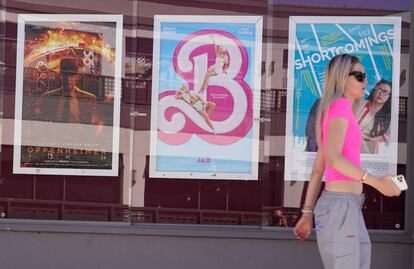Barbie’s Japanese distributor apologizes for its parent company’s reaction to Barbenheimer memes
Warner Bros. Japan said the Barbenheimer blitz is not part of an official company campaign, but said the reaction of its parent company’s Barbie account to memes combining images of the two movies lacked sensitivity

The Japanese distributor of the Warner Bros. movie “Barbie” has apologized for its U.S. parent company’s reaction to social media posts about the “Barbenheimer” blitz that combined images of Barbie and a mushroom cloud. The memes triggered criticisms in Japan for what many described as minimizing the atomic bomb attacks on Hiroshima and Nagasaki.
The movie about the world-famous doll and Universal Pictures’ Oppenheimer, a biography of Robert Oppenheimer, who helped develop the weapon, were both released on July 21 in the United States, sparking the Barbenheimer craze for watching both and prompting memes combining the two.
Some of the images, which were not created by Warner Bros., showed Margot Robbie, who played Barbie, sitting on the shoulders of Oppenheimer, played by Cillian Murphy, with an orange inferno of an atomic blast in the background.
The official Barbie account said in response to the combined Barbenheimer meme: “It’s going to be a summer to remember.”
Responding to another Barbenheimer meme showing Robbie’s hair replaced with an apparent mushroom cloud, the account commented, “This Ken is a stylist,” referring to Barbie’s boyfriend.
In Japan, the only country to have suffered atomic attacks, the posts drew criticism for what was perceived as belittling remarks about the nuclear attacks, triggering angry messages and trending on social media with the hashtag #NoBarbenheimer.
“We apologize to those who felt uncomfortable because of these inconsiderable reactions,” Warner Bros. Japan said in a statement posted on X, formerly Twitter.
One critical posting said many victims who perished under the mushroom clouds were children the same age of those playing with Barbie dolls and that the memes were inconsiderate. Others called them stupid and unforgivable, and urged for a boycott of the movie.
The United States dropped the world’s first atomic bomb on Hiroshima on Aug. 6, 1945, destroying the city and killing 140,000 people. It dropped a second bomb three days later on Nagasaki, killing another 70,000. Japan surrendered on Aug. 15, ending World War II and Japan’s nearly half-century of aggression in Asia.
Many survivors of the bombings have lasting injuries and illnesses resulting from the explosions and radiation exposure and face discrimination in Japanese society.
Warner Bros. Japan said the Barbenheimer blitz is not part of an official company campaign, but said the reaction of its parent company’s Barbie account to memes combining images of the two movies lacked sensitivity. “We believe it was extremely regrettable,” the Japanese distributor said, adding that it has requested its parent company to take appropriate action.
Barbie’s release in Japan is scheduled for Aug. 11.
Warner Bros. responses to the Barbenheimer memes were only the latest controversy for the film, which was banned in Vietnam — and criticized in some other Southeast Asian countries and in Washington.
Vietnam said the movie included an image of a map showing disputed waters in the South China Sea as belonging to China. Warner Bros. was quoted by the media as saying the map was a child-like drawing and was not intended to make any statement.
Sign up for our weekly newsletter to get more English-language news coverage from EL PAÍS USA Edition
Tu suscripción se está usando en otro dispositivo
¿Quieres añadir otro usuario a tu suscripción?
Si continúas leyendo en este dispositivo, no se podrá leer en el otro.
FlechaTu suscripción se está usando en otro dispositivo y solo puedes acceder a EL PAÍS desde un dispositivo a la vez.
Si quieres compartir tu cuenta, cambia tu suscripción a la modalidad Premium, así podrás añadir otro usuario. Cada uno accederá con su propia cuenta de email, lo que os permitirá personalizar vuestra experiencia en EL PAÍS.
¿Tienes una suscripción de empresa? Accede aquí para contratar más cuentas.
En el caso de no saber quién está usando tu cuenta, te recomendamos cambiar tu contraseña aquí.
Si decides continuar compartiendo tu cuenta, este mensaje se mostrará en tu dispositivo y en el de la otra persona que está usando tu cuenta de forma indefinida, afectando a tu experiencia de lectura. Puedes consultar aquí los términos y condiciones de la suscripción digital.








































